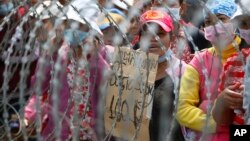International trade leaders say Cambodia’s workers and managers should continue to negotiate for an increase in wages, despite a deadly crackdown on worker protests earlier this month.
Workers want a raise in the minimum wage to $160 per month to keep up with the rising cost of living in Cambodia. Demonstrations turned violent on Jan. 2 and Jan. 3, ending in a shooting by police that left at least four people dead and nearly 40 injured.
Cathy Feingold, director of the International Department of the AFL-CIO, a federation of US labor unions, told VOA Khmer they had issued a letter to Prime Minister Hun Sen condemning the crackdown.
“Bargaining collectively is a way that workers and employers can sit down together and discuss the issues of wages and working conditions,” she said. “And that should be strongly supported in Cambodia.”
The statement from the AFL-CIO adds to growing criticism of the government’s handling of worker demonstrations. And it puts increased pressure on the industry to resolve the wage problem in a sector where some 400,000 Cambodians are employed.
In an open letter earlier this month, six US and Canadian retail associations urged an end to violence against workers and for wage negotiations to continue.
The letter was signed by the Retail Council of Canada, the American Apparel & Footwear Association, the US Fashion Industry Association, the Retail Industry Leaders Association, the Canadian Apparel Federation, and National Retail Federation.
“Our industry is committed to ensuring that all the products that they produce, source and sell are manufactured under lawful and humane conditions,” the groups said in a Jan. 15 letter. “As part of this commitment, we are committed to promoting the safety and security of workers in our supply chains.”
They called for negotiations “to permanently resolve the situation” to ensure the long-term stability of Cambodia’s garment and footwear industries, as well as “enable the Cambodian garment and footwear industry to maintain the strong relationships it has with our member companies.”
International calls for negotiations and a resolution have been echoed by local labor leaders.
Chea Mony, president of the Free Trade Union, said these amounted to serious pressure from outside the country that should push Cambodia towards more respect for human rights and the rights of workers.
“Prime Minister Hun Sen, who has served as leader for a long time, should reconsider,” Chea Mony said. “What can be solved, just solve it, so as not to make the situation worse.”
The international community, including the International Labor Organization and the UN’s special envoy for human rights, Surya Subedi, are also pushing for a non-violent solution, Chea Mony said. Violence against workers has to end, he said.
“The buyers cannot accept this, because clothes that people use in the world ought to be clean, with smiles and hope,” he said. “They don’t want the bloody clothes of the workers at all.”
Ath Thun, president of the Coalition of Cambodian Apparel Workers Democratic Union, said the positions of the international organizations and retailers are serious—and could lead to a decline in orders from Cambodian factories. That would lead to more demonstrations and further declines, he said.
“Then the business process of the industry won’t be able to make a profit,” he said. “And that impacts the entire economy.”
Government spokesman Phay Siphan said authorities do pay attention to workers issues, but he said the opposition, which has been protesting July’s election results, is also stoking worker unrest.
“We are happy with the attention of buyers that are partners with factories and workers,” he said. “It doesn’t mean the government is ignoring the minimum wage of workers. But the solution will be found amid a partnership, and the government will be the facilitator for the workers, factories and buyers.”
Peter Tan Keo, an economic analyst in Boston, Mass., said Cambodia will have to cooperate with the international community, or investors will find another place to go.
The current pressure for improved human rights, not tied to diplomacy, from Europe, the US, retailers and unions “is somewhat unprecedented,” he said. “It may show that the international community has grown increasingly tired of the status quo, and they're replacing hollow words with swift action.”
“Neither the Royal Government nor businesses investing in Cambodia are interested in absorbing sustained losses,” he said. “Without appropriate action from Cambodia, investor confidence will take a blow, as [foreign direct investment] can be easily diverted from Cambodia to safer, if not cheaper, investment climates.”
Labor Leaders Say Negotiations Should Continue
- Sok Khemara
- VOA Khmer

WASHINGTON DC —






